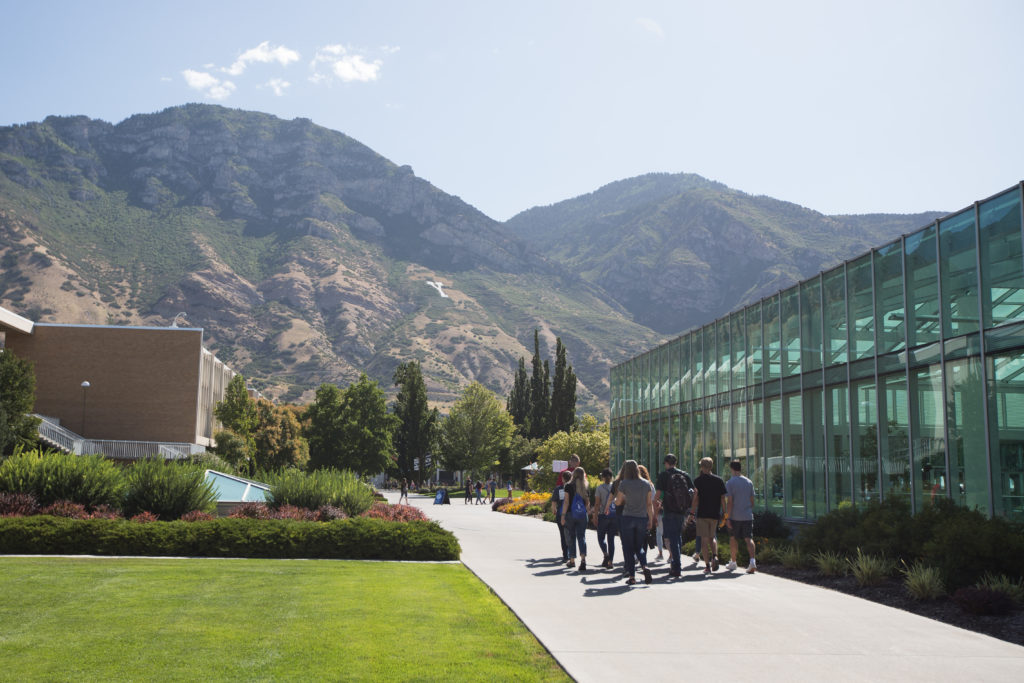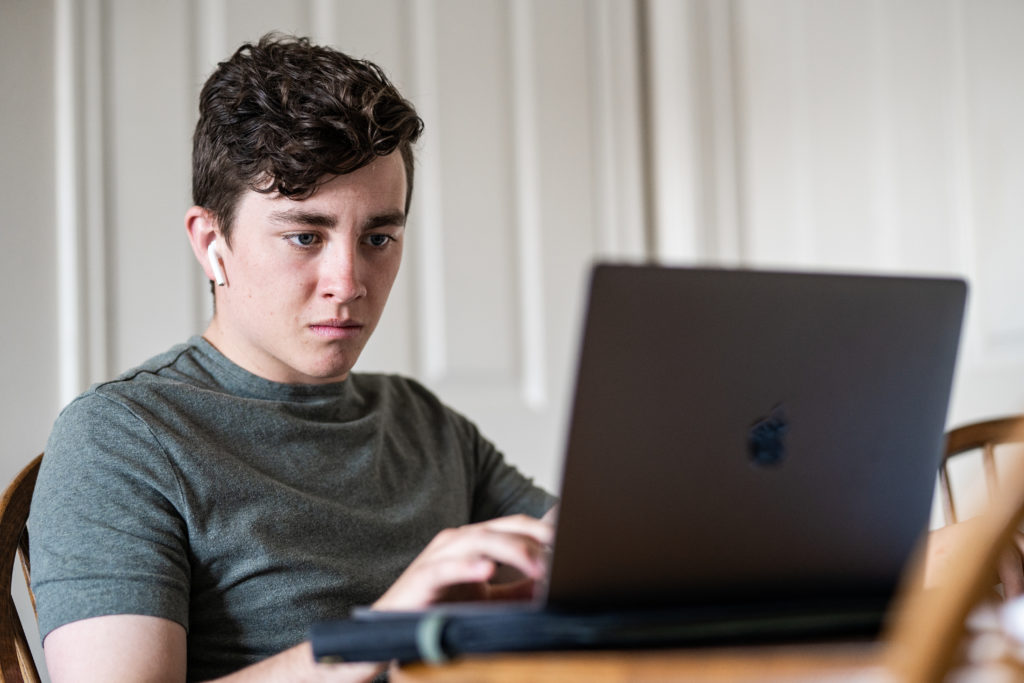Leer en español: BYU aprueba pasantías para el otoño con algunas estipulaciones

BYU announced last week that it will approve all domestic internships for Fall Semester as long as the student and internship provider sign a COVID risk waiver.
The move is a shift from the university’s halt on all internships that weren’t remote, on-campus or needed to maintain a visa status or an employment offer.
Although the changes open up opportunities for Fall, they came too late for some students and other students may still struggle to find an internship due to COVID-19’s adverse impact on the economy.
Dealing with upended plans
BYU student Lexi Carley had just completed the interview process for several internship positions across the country — including one with her dream company in New York City — in March. All of her internship possibilities were canceled when BYU shut down a majority of internships.
“Months of applying and interviewing and getting my hopes up were wasted,” she said. “Anytime it came up in conversation, I cried. It was hard to accept that something I had worked so hard for, for so long, could be derailed by a pandemic.”
Carley, an advertising senior from Colorado, is required to complete an internship per her program’s graduation requirements. Although an internship she had winter semester wouldn’t have counted towards graduation under normal circumstances, her program allowed her to receive credit for it. While this is a relief as far as credits, Carley says the loss of a summer internship may still impact her future.
“I imagine that I will need experience in a big city or big advertising firm before I am hired and I might have to do another internship next summer instead of getting a job,” Carley said.
She isn’t the only senior whose internship plans have been disrupted. Other BYU seniors have either had to move to remote internships or cancel their plans altogether for the summer.
Brad Harris, the experience design and management internship coordinator, said there were about 40 students in the major who had internships lined up when in-person internships were canceled. Although 30 were still able to find other internships or make remote arrangments, the rest will need to find another opportunity in the future.
Students who plan on graduating and are doing remote internships because of COVID-19 will fulfill graduation requirements. While Harris said they will still be well prepared, he believes they are missing out on rich, hands-on experiences.
“Let’s say that a resort in South Carolina had hired you to come and work there for the summer and then you find out you can’t go and you’re now doing marketing or Facebook stuff at the same resort. That’s not even close,” Harris said. “I don’t see a lot of positives other than students had to learn to overcome a difficulty that will help them in the future, and they had to learn to deal with setbacks.”
Karen Christensen, the Social Services & Community internships coordinator, expressed a similar sentiment about students preparing to go into social work.
“If you’re going to work in a social work field, you need to know that it’s a good fit for you, and trying it out is the best way,” Christensen said, adding she was excited about BYU’s announcement about Fall in-person internships. “They provide much stronger experience for students wanting opportunities for real-world, professional settings where they can have in-person mentoring, work alongside a team, and have meaningful responsibilities.”
Making adaptions
Other BYU schools and departments also had to adapt to the pandemic’s effect on internships and are continuing to do so despite BYU’s announcement about Fall internships.
“I think overall it’s been nice to just see that we can come together to find answers in a difficult time and still help students to push their careers forward,” School of Communications Director Ed Carter said.
The school requires internships for most of its programs, forcing it to consider alternative options to traditional in-person internships when the pandemic hit, including waiving the requirement for a few students, requiring fewer hours for internship credit and providing internships in the school’s student labs.
Carter said some of those options may be open to students in the future if necessary, but the school is looking at things on a case-by-case basis.
“I hope the message students are getting is, ‘Hey, we’ll work with you,'” Carter said. “We try to balance the upholding of our outcomes with kind of a merciful approach to realizing that things are pretty extraordinarily challenging right now.”

Public health students are also required to do an internship prior to graduation, and internship coordinator Stephanie Lutz said not a single student was held back from graduation due to the programs quick action to look for alternatives to in-person internships, although it was clear from the beginning the internship requirement would not be waived.
Lutz said alternatives included remote internships, mentored research, directed readings, and an “alternative assignment” that included modules, training and skill-based information about COVID-19 from a variety of agencies. Despite not being what they had planned for, Lutz said public health students are getting to practice the skills they’ve learned in real-time.
“We would consider this like a public health dream and a nightmare all mixed into one,” Lutz said. “(Students) are doing excellent things in the community.”
While law students are required to fulfill an internship requirement by either completing a qualifying externship or a professional skills course, Law School Dean Lynnett Rands said none of the students close to graduation were in danger of not fulfilling the requirement due to the pandemic.
“Most law students max out on the permitted number of externship hours that can count toward graduation,” Rands said. “I think the real story for us is how the law school community came together to support all of our students that had their international and other experiential learning plans dashed because of the pandemic.”
She said many law professors took on multiple research assistants during the summer and helped find replacement opportunities for students who had lost internships. She added that a large majority of law offices still offered summer internship programs.
Programs with less flexibility
Other programs aren’t able to be as flexible. Students going into teaching, for example, must complete student teaching to meet state licensing requirements. Students doing student teaching in the Fall will follow the rules the schools they teach in will be observing.
“If a student is uncomfortable teaching in the manner that is established by the guidelines and their mentor teacher, they will have the option to delay student teaching until the threat of the virus has been minimized,” BYU education advisement supervisor Brandan Beerli said. “There isn’t any other option to complete a mentored student teaching experience within our partnership otherwise.”
Likewise, nursing graduate students are required to complete 500 hours in a clinical setting to qualify to take the credentialing exam to become a family nurse practitioner. Because of this, the College of Nursing has not been able to decrease the number of hours graduate students are required to complete, according to Dean Jane Lassetter. However, she said students working towards August graduation were all able to be placed in clinical settings and she anticipates they will all be ready to graduate in August.
“For a while, we thought most of them would graduate in December, but our faculty have worked really hard to find good clinical placements so that they can finish by August graduation,” she said.
Although the state board of nursing doesn’t set a number of required hours in a clinical setting for undergraduates, Lassetter said the students need many clinical experiences to graduate from the program. “I don’t know how you could be a nurse without the clinical experience as a student,” she said.
Because of this need for clinical experience, the college is working to ensure students will be safe when working in clinical settings, including ordering N-95 masks for them.
“There are ways that you can go in and out of a clinical setting and make sure that when you get home, you’re going to minimize the risk of any spreading of the disease,” Lassetter said.




